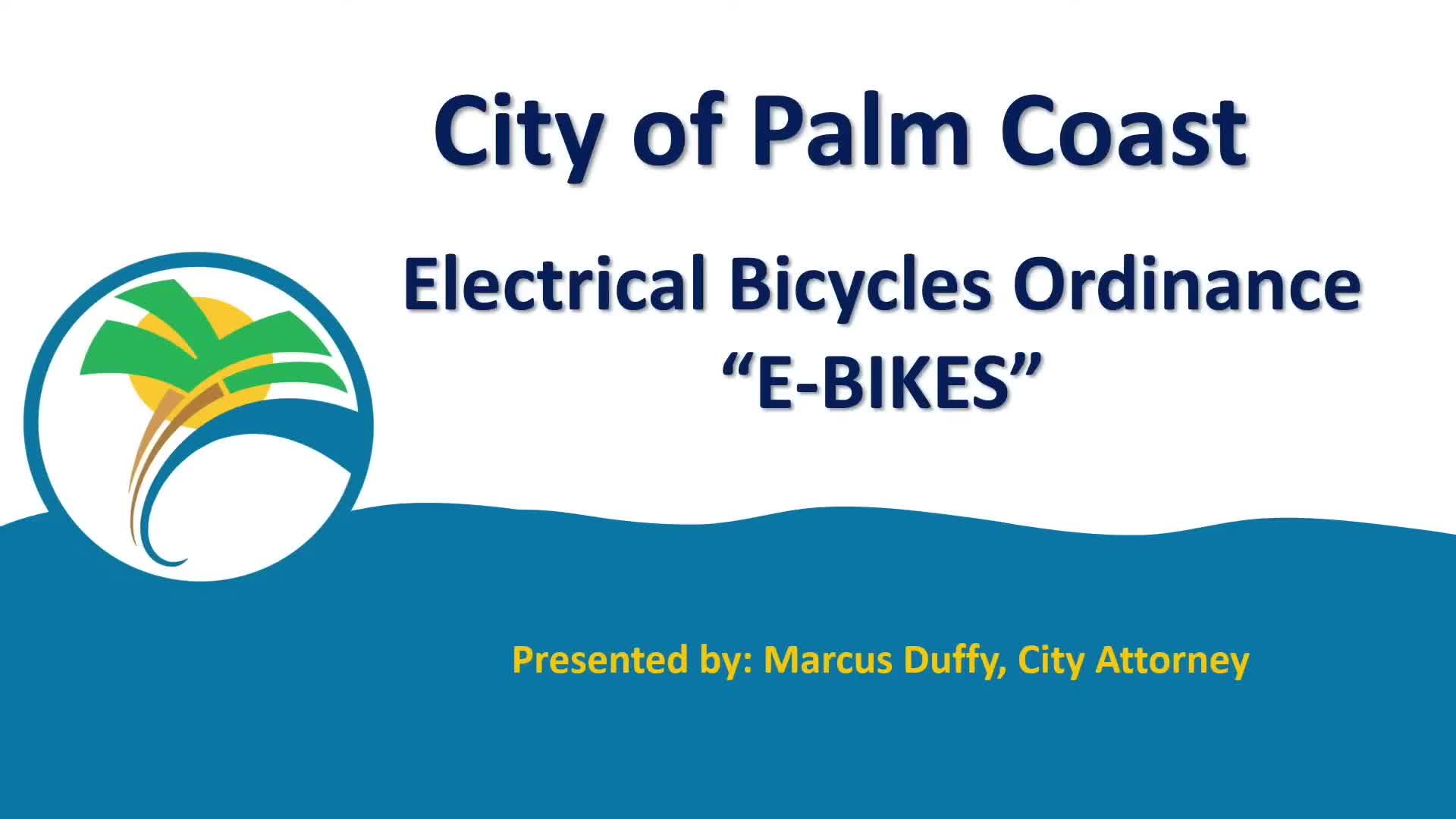Palm Coast works draft ordinance to regulate e-bikes, sets age, helmet and sidewalk rules; council seeks clearer language and education plan
Get AI-powered insights, summaries, and transcripts
Subscribe
Summary
City attorney and Flagler County sheriff’s office presented a draft ordinance to regulate electric bicycles and higher‑powered electric cycles; council members asked for clearer speed and sidewalk language, spoke about age limits and helmets, and directed staff to add an education and point‑of‑sale safety brochure program.
City staff and the Flagler County Sheriff’s Office presented a draft ordinance at the Sept. 9 workshop that would regulate electric bicycles (ebikes) and higher‑powered electric cycles on Palm Coast streets, paths and sidewalks. Councilmembers did not adopt the ordinance at first reading but requested clearer, simpler language — particularly on sidewalk speed limits and age limits — and asked staff to add coordinated education and point‑of‑sale safety outreach.
The draft distinguished three state statute‑defined classes of ebikes: Class 1 (pedal assist, max 20 mph), Class 2 (throttle assist, max 20 mph) and Class 3 (pedal assist, max 28 mph). It separately defined “electric powered cycles” as motorized vehicles with seats and no pedals — examples include electric dirt bikes — and would prohibit those higher‑powered machines on city streets, sidewalks and parks. The draft also set an operator‑ID requirement and required helmets for younger operators, following direction from council.
Why it matters: council members said uncontrolled speeds on sidewalks and misuse of high‑powered, converted bicycles pose safety risks to pedestrians and other vulnerable users; they also stressed enforcement feasibility and education as central concerns.
Key provisions and council feedback: the draft would require anyone operating an ebike to carry a government‑issued photo ID and prohibits electric powered cycles (no pedal, higher‑powered) on public streets and sidewalks. The draft proposed a 10 mph cap on sidewalks in some text passages; several council members objected to language that qualified “adjacent to roads” and asked the city attorney to simplify the rule to “no more than 10 mph on sidewalks,” to make enforcement and signage clearer.
Council members discussed minimum operator age. The draft recommended a minimum age of 15 for operators; the council debated lowering that to 13 or holding at 16. After discussion the council signaled consensus around allowing an operator minimum of 13 for some low‑power ebikes while noting the city can amend the threshold if the state adopts different rules.
Enforcement and penalties: the draft outlined civil penalties up to $100 for violations and allowed impoundment for higher‑powered electric powered cycles used in violation of the ordinance. Flagler County Sheriff’s Office general counsel John LeMaster said modifications that remove governors or pedals would remove a vehicle from ebike status under statute; those altered machines would be subject to separate enforcement because they no longer meet the statutory ebike definition.
Education and certification: council members and public commenters repeatedly emphasized education and training for riders. Several speakers asked for a city‑run or partner‑run safety course and an on‑line test or licensing model tied to point‑of‑sale certification. Local bike shop owners offered to provide rider education at the point of purchase and suggested a dealer‑delivered safety brochure or certification option. The council asked staff to prepare a simple safety brochure for distribution at bike dealers and to coordinate school and law‑enforcement outreach; staff said they will draft materials and that the sheriff’s office is working on draft state legislation requiring training.
Public testimony split along use and safety lines. Several business owners and frequent riders urged caution about overly restrictive rules that would push seniors and recreational riders off sidewalks into traffic. Other residents described a surge in high‑speed, converted ebikes being used in crimes and urged a strict approach to prohibit high‑powered electric cycles on public property. A Palm Coast resident described repeated late‑night break‑ins and said thieves were using modified electric bikes to evade police; deputies confirmed ebikes have been used in some local eluding incidents.
Next steps: the council scheduled first reading next week and asked staff and the sheriff’s office to revise the draft with clearer sidewalk‑speed language, a helmet/earbud provision, and a plan for outreach and education (including a dealer brochure and school/sheriff safety classes). Staff also will monitor pending state legislation that may add a statewide licensing or testing requirement.
Sources: Draft ordinance and council discussion at the Sept. 9 workshop; presentation by City Attorney Marcus Duffy and Flagler County Sheriff’s Office General Counsel John LeMaster; public testimony from local shop owners and residents.
